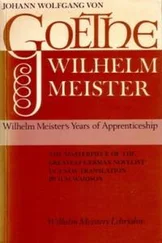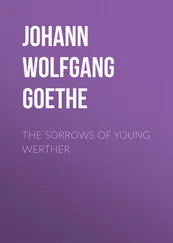About ten in the morning, Werther called his servant, and, whilst he was dressing, told him that in a few days he intended to set out upon a journey, and bade him therefore lay his clothes in order, and prepare them for packing up, call in all his accounts, fetch home the books he had lent, and give two months' pay to the poor dependants who were accustomed to receive from him a weekly allowance.
He breakfasted in his room, and then mounted his horse, and went to visit the steward, who, however, was not at home. He walked pensively in the garden, and seemed anxious to renew all the ideas that were most painful to him.
The children did not suffer him to remain alone long. They followed him, skipping and dancing before him, and told him, that after to–morrow and tomorrow and one day more, they were to receive their Christmas gift from Charlotte; and they then recounted all the wonders of which they had formed ideas in their child imaginations. "Tomorrow and tomorrow," said he, "and one day more!" And he kissed them tenderly. He was going; but the younger boy stopped him, to whisper something in his ear. He told him that his elder brothers had written splendid New–Year's wishes so large! one for papa, and another for Albert and Charlotte, and one for Werther; and they were to be presented early in the morning, on New Year's Day. This quite overcame him. He made each of the children a present, mounted his horse, left his compliments for papa and mamma, and, with tears in his eyes, rode away from the place.
He returned home about five o'clock, ordered his servant to keep up his fire, desired him to pack his books and linen at the bottom of the trunk, and to place his coats at the top. He then appears to have made the following addition to the letter addressed to Charlotte:
"You do not expect me. You think I will obey you, and not visit you again till Christmas Eve. O Charlotte, today or never! On Christmas Eve you will hold this paper in your hand; you will tremble, and moisten it with your tears. I will—I must! Oh, how happy I feel to be determined!"
In the meantime, Charlotte was in a pitiable state of mind. After her last conversation with Werther, she found how painful to herself it would be to decline his visits, and knew how severely he would suffer from their separation.
She had, in conversation with Albert, mentioned casually that Werther would not return before Christmas Eve; and soon afterward Albert went on horseback to see a person in the neighbourhood, with whom he had to transact some business which would detain him all night.
Charlotte was sitting alone. None of her family were near, and she gave herself up to the reflections that silently took possession of her mind. She was for ever united to a husband whose love and fidelity she had proved, to whom she was heartily devoted, and who seemed to be a special gift from Heaven to ensure her happiness. On the other hand, Werther had become dear to her. There was a cordial unanimity of sentiment between them from the very first hour of their acquaintance, and their long association and repeated interviews had made an indelible impression upon her heart. She had been accustomed to communicate to him every thought and feeling which interested her, and his absence threatened to open a void in her existence which it might be impossible to fill. How heartily she wished that she might change him into her brother,—that she could induce him to marry one of her own friends, or could reestablish his intimacy with Albert.
She passed all her intimate friends in review before her mind, but found something objectionable in each, and could decide upon none to whom she would consent to give him.
Amid all these considerations she felt deeply but indistinctly that her own real but unexpressed wish was to retain him for herself, and her pure and amiable heart felt from this thought a sense of oppression which seemed to forbid a prospect of happiness. She was wretched: a dark cloud obscured her mental vision.
It was now half–past six o'clock, and she heard Werther's step on the stairs. She at once recognised his voice, as he inquired if she were at home. Her heart beat audibly—we could almost say for the first time—at his arrival. It was too late to deny herself; and, as he entered, she exclaimed, with a sort of ill concealed confusion, "You have not kept your word!" "I promised nothing," he answered. "But you should have complied, at least for my sake," she continued. "I implore you, for both our sakes."
She scarcely knew what she said or did; and sent for some friends, who, by their presence, might prevent her being left alone with Werther. He put down some books he had brought with him, then made inquiries about some others, until she began to hope that her friends might arrive shortly, entertaining at the same time a desire that they might stay away.
At one moment she felt anxious that the servant should remain in the adjoining room, then she changed her mind. Werther, meanwhile, walked impatiently up and down. She went to the piano, and determined not to retire. She then collected her thoughts, and sat down quietly at Werther's side, who had taken his usual place on the sofa.
"Have you brought nothing to read?" she inquired. He had nothing. "There in my drawer," she continued, "you will find your own translation of some of the songs of Ossian. I have not yet read them, as I have still hoped to hear you recite them; but, for some time past, I have not been able to accomplish such a wish." He smiled, and went for the manuscript, which he took with a shudder. He sat down; and, with eyes full of tears, he began to read.
"Star of descending night! fair is thy light in the west! thou liftest thy unshorn head from thy cloud; thy steps are stately on thy hill. What dost thou behold in the plain? The stormy winds are laid. The murmur of the torrent comes from afar. Roaring waves climb the distant rock. The flies of evening are on their feeble wings: the hum of their course is on the field. What dost thou behold, fair light? But thou dost smile and depart. The waves come with joy around thee: they bathe thy lovely hair. Farewell, thou silent beam! Let the light of Ossian's soul arise!
"And it does arise in its strength! I behold my departed friends. Their gathering is on Lora, as in the days of other years. Fingal comes like a watery column of mist! his heroes are around: and see the bards of song, gray–haired Ullin! stately Ryno! Alpin with the tuneful voice: the soft complaint of Minona! How are ye changed, my friends, since the days of Selma's feast! when we contended, like gales of spring as they fly along the hill, and bend by turns the feebly whistling grass.
"Minona came forth in her beauty, with downcast look and tearful eye. Her hair was flying slowly with the blast that rushed unfrequent from the hill. The souls of the heroes were sad when she raised the tuneful voice. Oft had they seen the grave of Salgar, the dark dwelling of white–bosomed Colma. Colma left alone on the hill with all her voice of song! Salgar promised to come! but the night descended around. Hear the voice of Colma, when she sat alone on the hill!
"Colma. It is night: I am alone, forlorn on the hill of storms. The wind is heard on the mountain. The torrent is howling down the rock. No hut receives me from the rain: forlorn on the hill of winds!
"Rise moon! from behind thy clouds. Stars of the night, arise! Lead me, some light, to the place where my love rests from the chase alone! His bow near him unstrung, his dogs panting around him! But here I must sit alone by the rock of the mossy stream. The stream and the wind roar aloud. I hear not the voice of my love! Why delays my Salgar; why the chief of the hill his promise? Here is the rock and here the tree! here is the roaring stream! Thou didst promise with night to be here. Ah! whither is my Salgar gone? With thee I would fly from my father, with thee from my brother of pride. Our race have long been foes: we are not foes, O Salgar!
Читать дальше








![Иоганн Гёте - Итальянское путешествие [litres]](/books/398657/iogann-gete-italyanskoe-puteshestvie-litres-thumb.webp)



